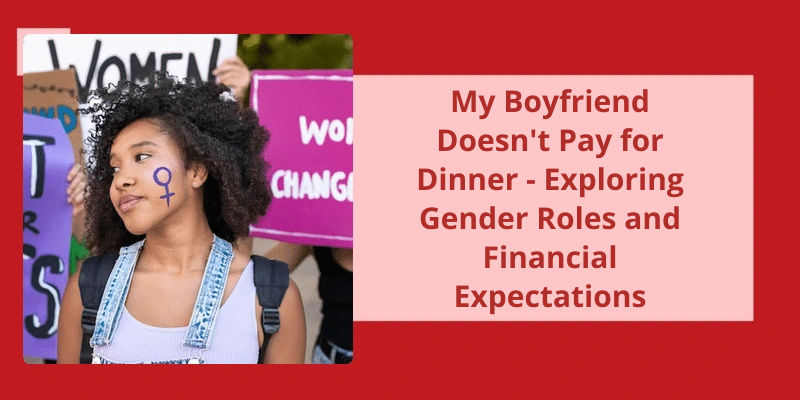As humans, we thrive on social inclusion, where dinner invitations present the perfect opportunity to connect, share and enjoy the blessings of life with someone we cherish. While some may argue that the essence of such encounters transcends the transaction of monetary value, others may firmly stand their grounds in defense of practicality. Regardless of one's opinion, it's important to acknowledge the varying perspectives on whether or not it's acceptable for a partner to consistently refuse to pay for dinners. In this piece, we'll explore the dynamics that come with partners who don't pay for meals, the reasons that may be behind it and tips for navigating such situations.
Should I Pay for My Girlfriend Dinner?
The question of whether or not a man should pay for his girlfriends dinner has been debated for generations. It isn’t an easy answer because there are many different factors that come into play. For example, if the man was the one who invited the woman out, then it would be appropriate for him to pay for her dinner. After all, he was the one who initiated the invitation, so it only makes sense that he’d foot the bill.
This is the traditional way of doing things, and it’s still considered polite in many cultures. It shows that the woman is willing to treat her date as an equal and not as someone who needs to be taken care of. It also shows that she isn’t expecting the man to pay for everything in the relationship.
Of course, there are times when neither person knows who should pay for the meal. In this case, it’s perfectly acceptable to ask for separate checks. It takes the pressure off of both parties and avoids any awkwardness or uncomfortable feelings. If both people are truly interested in each other and want to continue seeing each other, then they’ll find a way to split the bill without it ruining the evening.
In some relationships, one person may make more money than the other. This can create a power imbalance and cause tension in the relationship. However, it’s still important for both parties to contribute equally to the relationship, whether that means paying for dinner or taking turns paying for each others meals. If one person is constantly paying for everything, then it can create resentment and lead to arguments down the road.
The Perceived Value of Paying for Dinner in a Relationship and Whether It Is a Reflection of Commitment or Status
- There’s a perception that paying for dinner in a relationship reflects commitment and status.
- Some people believe that if a man pays for a date, it shows that he’s committed and serious about the relationship.
- Others see paying for dinner as a reflection of status, where the person who pays holds a higher position of power in the relationship.
- However, there are also those who believe that paying for dinner is simply a polite gesture, without any deeper meaning.
- Ultimately, the perceived value of paying for dinner in a relationship varies widely depending on individual beliefs and cultural customs.
Now that we’ve discussed the traditional roles of cost allocation in weddings, it’s important to recognize that times have changed. As couples become more independent and financially stable, these traditional responsibilities are shifting and evolving. In today’s world, the cost of a wedding is usually split between both families and the couple themselves. Nevertheless, it’s important for couples to have an honest and open discussion about finances early on to avoid any unnecessary stress or conflict in the wedding planning process.
Who Pays for Dinner in a Marriage?
However, in modern times, these traditions have changed, and it’s no longer expected that the grooms family will foot the bill for everything. Instead, many couples now opt to split the costs or pay for everything themselves. This is especially true if the couple has been living together for some time prior to getting married and may have already established their own financial independence.
In general, the person who invites the other on a date is expected to pay for dinner. However, in a marriage, this traditional rule may not apply. In a healthy marriage, financial decisions should be made jointly, with both partners contributing equally to household expenses. If one partner earns significantly more than the other, they may choose to contribute a larger portion of their income, but ultimately, the decision should be made together.
Ultimately, the most important thing is for the couple to communicate openly and honestly about their financial expectations. Setting a budget early on in the marriage and sticking to it can help prevent conflicts and ensure that both partners feel comfortable and secure in their financial situation. At the end of the day, it doesn’t matter who pays for dinner or any other expenses, as long as there’s mutual respect and understanding in the relationship.
It’s often a topic of debate whether you should pay for your girlfriend’s family dinner when you’re invited to join them. While some may argue that it’s polite to offer to pay or pay your own way, it’s important to consider cultural and traditional expectations. In many cases, her family will take care of the bill as a gesture of hospitality and gratitude for your presence. However, there are a few things to keep in mind before making any assumptions or decisions.
Should I Pay for My Girlfriends Family Dinner?
When it comes to paying for your girlfriends family dinner, there are a few things to consider. Firstly, it’s important to understand the context of the dinner invitation. If the invitation is for a formal or special occasion, it’s likely that her family will be paying for the meal as they’re the hosts. In this case, it’s appropriate to offer to pay for your share or to bring a gift for the host/hostess as a token of appreciation.
However, it’s important to remember that you should never assume that you’ll be paying for the meal unless it’s been explicitly stated. It’s always best to ask beforehand or to wait for the host to make a decision. If they do insist on paying for the meal, be gracious and genuine in your appreciation and thank them for their hospitality.
If you do decide to pay for the meal, it’s also important to do so discreetly and without drawing attention to yourself. The goal is to be polite and considerate, not to show off or make a big deal out of it. And if you can’t afford to pay for everyones meal, it’s okay to express this and offer to pay for your own share or to contribute to the bill in some other way.
Do what feels appropriate and respectful in the context of the situation, and remember to be gracious and polite no matter what the outcome.
Conclusion
In conclusion, the act of paying for dinner may seem like a small and insignificant gesture in a relationship, but it can reveal a lot about a person's values and priorities. Ultimately, it’s up to each individual couple to determine their own expectations and boundaries when it comes to splitting expenses. However, it’s important to have open and honest communication about finances and to respect each other's financial situations and choices. Whether it's splitting the bill evenly, taking turns paying, or finding other ways to balance the financial aspect of a relationship, the key is to approach it with respect, understanding, and a willingness to work together as a team.






